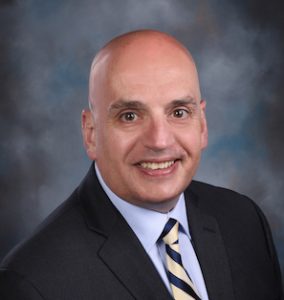Explore This Issue
ACEP Now: Vol 36 – No 05 – May 2017This year’s ACEP Leadership & Advocacy Conference (LAC) was perfectly timed to provide ACEP members an amazing opportunity to have their voices heard on the crucial issue of health care reform in Washington, D.C. With a new presidential administration and the newly seated 115th Congress considering a potential vote to repeal and replace the Affordable Care Act (ACA or Obamacare) at the time, the change in the timing of this meeting to March from the usual May scheduling seemed downright visionary.
However, the weather was not as cooperative, with the possibility of a major snowstorm forcing significant changes to the conference agenda. Although it took some good old-fashioned emergency medicine flexibility and ingenuity, most of the conference attendees were able to make it to Capitol Hill to meet with members of Congress and their staff to carry the message of how important emergency medicine is to the viability of our national health care system.
Although the conference didn’t officially start until Monday, March 13, there were many pre-meeting events and committee meetings where important business of the College got done. With 120 emergency medicine residents and medical student registrants at the meeting, the Emergency Medicine Residents’ Association (EMRA) and the ACEP Young Physicians Section (YPS) started the action on Sunday with their Health Policy Primer program.
This half-day session included great presentations beginning with an “Intro to Health Policy” talk by Rachel Solnick, MD, who serves as EMRA’s legislative advisor, followed by insightful lectures on mental health, graduate medical education, the ACA, and how the Medicare Access and CHIP Reauthorization Act (MACRA) will affect physician payments for years to come. William Jaquis, MD, FACEP, from the ACEP Board of Directors closed the program with “A Roadmap to Getting Involved,” encouraging the attendees to be persistent in their advocacy efforts and to work through ACEP’s many opportunities to be contributors in the health policy arena.
LAC is really two meetings in one. The first two days are the “Advocacy” part of the meeting, which culminates with official Hill visits to members of Congress at the Capitol. The last day is the “Leadership” program, which focuses more on professional development and how to be a better leader and advocate for yourself, your colleagues, and your patients. This year’s leadership program offered great presentations, including:
- “Leadership Resiliency During Times of Constant Change” by ACEP President Rebecca Parker, MD, FACEP
- “Where the Rubber Meets the Road: The Intersection of Social Media and EM” moderated by Ryan Stanton, MD, FACEP; and featuring Alicia M. Kurtz, MD; Howard K. Mell, MD, MPH, CMPE, FACEP; and Karolyn K. Moody, DO, MPH
- “The Impact of Implicit Bias: Leaders Beware” moderated by Douglas M. Char, MD, FACEP; and featuring Adrian M. Daul, MD, FACEP;Vidya Eswaran, MD; Kevin M. Klauer, DO, FACEP; Aisha T. Liferidge, MD, FACEP; and Bernard L. Lopez, MD, FACEP
- “Leadership Under Fire: When Crisis Defines Us” moderated by Robert W. Strauss Jr., MD, FACEP; and featuring Kathleen J. Clem, MD, FACEP; and Chad Kessler, MD, MHPE, FACEP
This year’s advocacy conference agenda was full of timely and informative presentations, including:
- “Creating Solutions to the Opioid Crisis” by Eric Ketcham, MD, MBA, FACEP, FACHE; and Mark S. Rosenberg, DO, MBA, FACEP
- “Reporting Under MACRA–CEDR” by Stephen K. Epstein, MD, MPP, FACEP; and Pawan Goyal, MD, MHA, CBA, PMP, FHIMSS, FAHIMA
- “Out-of-Network/Balance Billing—Where Are We? A Federal/State Update” by Edward R. Gaines III, JD, CCP; Alison Haddock, MD, FACEP; and Nathan R. Schlicher, MD, JD, FACEP
- “Affordable Care Act—Repeal or Replace? What’s Next” by Sen. Tim Kaine (D-VA), a 2016 vice presidential candidate
Day one of the conference was closed with an informative and entertaining presentation by ZDoggMD, Zubin Damania, MD, who did his one-man show on physician burnout and how to be resilient in the difficult world of being a health care professional.
The Hot Topic
Although ACEP has legislation that has been introduced in the 115th Congress on a number of important topics, such as EMTALA liability reform, this year’s legislative focus was clearly on the Republican proposal to repeal and replace the ACA, titled the American Health Care Act (AHCA). During the meeting, the Congressional Budget Office (CBO) provided a scorng of the original bill introduced in the U.S. House. The CBO is a nonpartisan office of the federal government that provides a fiscal note to a bill. This fiscal note delineates the proposed financial effects of a bill over a 10-year period. With the CBO report highlighting the fact that about 24 million people would lose health care coverage over the 10-year period, the conference attendees were focused on making sure emergency medicine’s message made it to the Hill. Under the leadership of Dr. Parker, ACEP developed a position of supporting key principles for evaluating any proposed health care reform legislation. Rather than being “for” or “against” a bill or reform plan, ACEP stood committed to making sure that our public leaders recognize the importance of emergency medicine in any health care system reform.
ACEP issued the following emergency medicine health care reform principles that it considers indispensable to any replacement legislation. The principles are aimed at maximizing access to medical care while improving its quality and lowering its costs.
- Maintain emergency services as a covered benefit for any insurance plan.
- Ensure the federal prudent layperson standard extends to Medicaid fee-for-service and that compliance measures are in place for all other health plans. The prudent layperson standard requires health insurance companies to cover claims based on a patient’s symptoms, not the final diagnosis. It means, for example, if a patient has chest pain but the diagnosis is ultimately a less urgent medical condition, such as a panic attack, the health insurance company cannot retrospectively deny coverage.
- Require health insurance companies to be transparent with the data used to determine in- and out-of-network reimbursement rates for their patients’ medical care. Ensure appropriate reimbursement rates for emergency services.
Eliminate the need for prior authorization for emergency services and guarantee parity in coverage and patient co-payments for in- and out-of-network emergency care services. - Retain protections for preexisting conditions, no lifetime limits, and allowing children to remain on their parents’ insurance plan until age 26.
- Enact meaningful medical liability reforms, including protections for physicians who provide federally mandated EMTALA-related services, who care for patients in a federally declared disaster area, and who follow clinical guidelines established by national medical specialty societies.
- Ensure any continuation or expansion of health savings accounts, health reimbursement accounts, association health plans, and individual health pools provides meaningful health insurance benefits and coverage for individuals and families, including access to emergency care services.
- Repeal the Independent Payment Advisory Board and the excise tax on high-cost employer health benefit plans. Delay repeal of the Center for Medicare & Medicaid Innovation until at least 2020 or amend it to eliminate mandatory provider participation in Medicare models. This will allow an adequate transition period for the Transforming Clinical Practice Initiative grants aimed at lowering costs, improving health outcomes, and delivering more effective care.
- Acknowledge the role of freestanding emergency centers and other health care delivery models as crucial to encouraging coverage innovation.
- Protect the most vulnerable populations in this country by making sure Medicare, Medicaid, and the Children’s Health Insurance Program (CHIP) remain available and solvent for current and future generations.
Although the AHCA was eventually pulled from the floor of the U.S. House before a vote was taken, there is no doubt that there will be renewed attempts to reform the health care delivery and financing system in the near future. The principles ACEP have adopted will continue to serve as the guidepost for whether ACEP will support future proposed legislation.
Be There Next Year
Given the continued pressures on the health care system to deliver high-quality, accessible, and affordable care to this nation, there will always be a need for emergency physicians and emergency care. However, it is exactly those same pressures that threaten to reduce the funding and support for emergency medicine as health care expenditures rise and the population grows and ages. LAC is a great opportunity for you to become more educated about the issues facing health care and our specialty and to have your voice heard directly by members of Congress.
Make sure that you come to the next LAC meeting, May 20–23, 2018, to be part of the voice of emergency medicine on Capitol Hill!
Pages: 1 2 3 | Multi-Page




No Responses to “ACEP LAC Meeting Lets Members Voice Concerns about Health Care Reform on Capitol Hill”